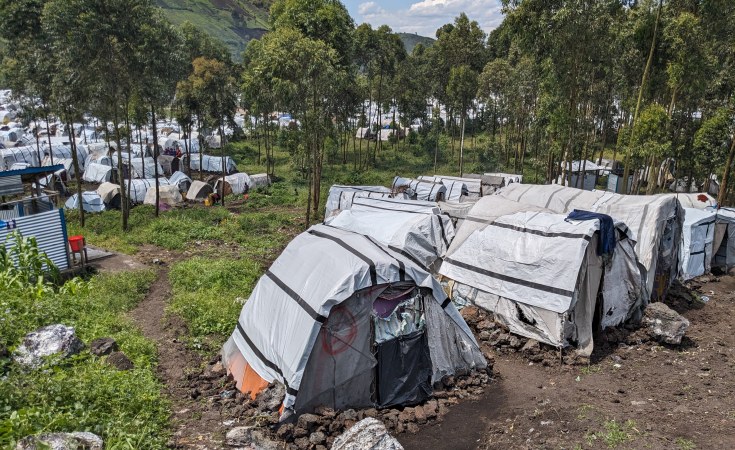A deadly attack on Friday 3 May directly hit displacement sites hosting over 55,000 families around Goma in the North Kivu province in eastern Democratic Republic of Congo (DRC).
International non-governmental organisations (INGOs) actively engaged in the humanitarian response in the country urgently call on all parties to the conflict to respect the civilian nature of displacement sites, to protect civilians and to allow for continued lifesaving support to affected populations who remain in dire need of assistance.
It is the third time a displacement site has been indiscriminately bombed in less than six months, killing at least 18 people and injuring 32 more. INGOs strongly condemn the indiscriminate shelling of displacement sites, which contravenes International Humanitarian Law.
Overcrowded displacement camps are no longer safe spaces for the civilian population, especially for women and children. In addition to indiscriminate shelling, the close proximity of heavy artillery with the camps together with the widespread presence of armed elements within the sites have resulted in a rise of security incidents endangering both the affected populations and aid workers. Fighting has also intensified in the neighbouring province of South Kivu, where over 500,000 Internally Displaced Persons hosted in Minova are also exposed to the risk of shelling and insecurity resulting in recurring forced displacements.
After fleeing extreme violence, men, women and children arrive in dire financial, physical and psychological conditions in the sites, only to face further protection risks, including sexual and gender-based violence (SGBV), due to the presence of armed elements. Despite humanitarian organisations reporting a rising number of assaults and killings, including a reported weekly average of 50 SGBV incidents in the camps, the situation has significantly worsened. In April alone, over 5,000 people sought psychosocial support in Lushagala camps 1 and 2 with a great number reporting sexual violence in less than 72 hours. Moreover, humanitarian access is hindered by insecurity on a daily basis leaving the population without much needed assistance.
INGOs have continuously advocated for the protection of civilians as the conflict in North and South Kivu intensifies in complete disregard of the Luanda Peace Process. In the first quarter of 2024, the monthly average of artillery fire has resulted in two and a half times as many civilian casualties compared to late 2023.
As indiscriminate attacks on displacement sites are becoming more frequent, the humanitarian toll has reached a breaking point while the delivery of aid becomes more challenging. This is not a time for business as usual. We are calling for the immediate cessation of hostilities and for all parties of the conflict to abide with International Humanitarian Law and protect civilians in conflict. The international community has a responsibility to urgently use all diplomatic means at their disposal to facilitate a political solution to the conflict. Warring parties must protect civilians and civilian settlements and must allow for safe and unhindered humanitarian access to deliver impartial and neutral lifesaving services to the vulnerable population.
Notes to Editors:
- It is the third time a displacement site has been indiscriminately bombed in less than six months (INSO).
- 500,000 Internally Displaced Persons are currently hosted in Minova (OCHA).
- In April 2024 alone, over 5,000 people sought psychosocial support in Lushagala camps 1 and 2 with a great number reporting sexual violence in less than 72 hours (ACF).
- In the first quarter of 2024, the monthly average of artillery fire affecting civilian infrastructure has more than doubled compared to late 2023, resulting in four times as many civilian casualties (INSO).
- At 9.30 in the morning on 3 May, at least five shells hit displacement sites in Goma hosting over 55,000 households, according to the United Nations Office for the Coordination of Humanitarian Affairs.
- Despite humanitarian organisations having reported an increasing number of assault and killings, including a weekly average of 50 sexual and gender based violence inside the camps, according to WFP women, girls and the protection crisis in eastern DRC.
For more information or to arrange an interview, please contact:
- NRC global media hotline: media@nrc.no, +47 905 62 329
- Ousmane Drabo, regional media adviser in Dakar, ousmane.drabo@nrc.no, +221 776 234 040
Signed,
Action Against Hunger
CARE
CODESPA
Concern Worldwide
Danish Refugee Council
INSO
GiveDirectly
Handicap International
Médecins du Monde
Première Urgence Internationale
Norwegian Refugee Council
Tearfund
World Vision
Forum des ONGI en RDC


